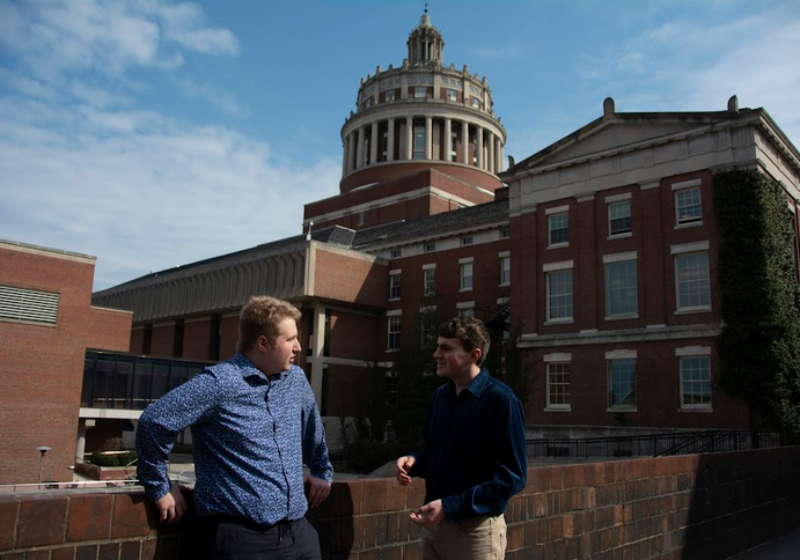Sophomore Daniel Pyskaty, former SA Senator and Chair of the Academic Affairs Committee, will be next year’s SA President, succeeding former President, junior Adrija Bhattacharjee, and VP, junior Sybilla Moore.
Pyskaty and running mate first-year Elijah Bader-Gregory, former Senator, amassed 817 total votes — nearly three times as many votes as the next ticket, composed of first-year duo Guruansh Kohli and Jake Adelmann, according to the official election results.
Comparatively, the Kohli/Adelmann ticket beat out the remaining two tickets by 196 and 197 votes respectively.
The vote stands unchallenged after a campaign season wrought with accusations against candidates and official All-Campus Judicial Council hearings.
Broadly, the Pyskaty/Bader-Gregory ticket aims to emphasize administrative transparency and student representation in administration, as referenced in their official 18-page platform.
“Throughout the campaign, we highlighted the need to address basic student needs that are falling behind with the increase of size to the student body,” Pyskaty told the Campus Times.
He and Bader-Gregory will be especially focused on making sure that “basic needs and services” are provided to students — including housing, dining, accommodation services, advising, and healthcare.
“We have already seen with the housing lottery this week or UHS/UCC shortages that the system does not even work for the current student load, so the work begins now and throughout the summer to try and make a functioning system that will support students’ basic needs,” Pyskaty said.
In terms of administrative transparency, Pyskaty and Bader-Gregory will “relentlessly advocate” for access to University budgeting information and the University’s strategic plan, according to their platform. They will also push for administrators to be “more visible at student organized campus events” to encourage an understanding of students’ perspectives.
“We should see our administrators more than once a year in Starbucks,” they said in their platform.
Access to budgeting information and the University’s strategic plan, Pyskaty and Bader-Gregory believe, is an important first step to elevating student voices.
In light of weeks of protests by student groups such as the Students for a Democratic Society, College Feminists, and the Stop the Build protesters, student frustrations with administration have only increased.
Nevertheless, Pyskaty and Bader-Gregory are hopeful that administration will be receptive to increased student presence in administrative issues.
“I think that we stand at a very interesting point in which we are experiencing a large turnover in almost every administrative level and entering an era in many facets of University leadership,” Pyskaty said. “Elijah and I have found it essential from day one to build productive working relationships with these stakeholders for student advocacy. By showing the importance of the student voice in the decision-making processes that inherently affect students in the first place, we can become better forces for change.”
The two are also looking to rebuild a strong legislative branch, following what they call a “rocky road in Senator retention and intercommunication” over the past few years.
One notable proposal includes the creation of executive task forces — a group of SA members and student leaders to tackle University issues at hand. These task forces would address specific decisions and injustices on campus that demand a student response.
Pyskaty stressed that, to truly advocate for chance, students should stand together with the largest voice possible.
“This increases our collective bargaining power and voice in the meetings provided to the Students’ Association and will allow us to bring as many voices into these conversations as possible,” he said.
They also aim to prioritize underrepresented voices in student government, primarily in the form of an expanded Presidential Advisory Council (PAC). This would include both appointed and applicant members, but would focus on a “diverse selection of voices, backgrounds, and experiences.”
“For too long, the University has not realized the disproportionate effects that their policies and actions have had on our minority communities and have been complacent of the harmful effects that these policies and actions still have on members of our student community today,” says their official platform.
The two also hope to tackle a number of hot-button topics on campus, including access to reproductive healthcare, and ongoing issues with academic affairs, housing, and dining.
Next, they propose the creation of a Housing and Dining Committee to allow for a more “focused and informed approach to addressing the problems arising in these departments.” Dining plan freedom, increased dietary options campus-wide, and meal availability throughout religious holidays mark important points of their propositions for dining halls and Hillside Market.
Additionally, Pyskaty and Bader-Gregory make specific reference to a number of housing issues — and intend to “call out administrators” for their response to the ongoing housing crisis.
In terms of academic affairs, Pyskaty, former chair of the Academic Affairs Committee, stresses academic freedom and the implementation of a new course catalog to suit student needs. There will be a continued push for the catalog project to host “important planning tools,” such as course syllabi and schedules.
Pyskaty and Bader-Gregory also reference changes to Public Safety, University Health Services, Disability Resources, and general sustainability. Full details on their propositions can be found on their platform.
Pyskaty hopes to build a strong, diverse SA for the upcoming year — and encourages students to reach out to him and Bader-Gregory with any questions or concerns about student government overall.
“The bulk of SA is made out of passionate students that aren’t elected, and it is a great way to get involved in making campus a better place — I promise we’re fun,” he said.
Then, to administrators, Pyskaty emphasized the importance of broaching massive issues that “cannot be waited upon” — chiefly housing quality and availability, basic healthcare services, and dining halls.
“We are ready to build solutions that best work for students,” he said. “We hope that you are ready to fully tackle these issues with us.”







